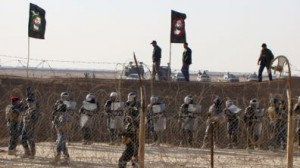UN News Center
27 December 2011 – Secretary-General Ban Ki-moon has welcomed an agreement between the United Nations and the Iraqi Government that provides for the voluntary relocation of residents of a camp hosting Iranian exiles, saying the pact lays the foundation for a peaceful and durable solution to the issue.
The memorandum of understanding (MoU) signed on Sunday stipulates that the Government will relocate the residents of Camp New Iraq, formerly known as Camp Ashraf, to a temporary transit location where the UN High Commissioner for Refugees (UNHCR) will start a process of refugee status determination, a necessary first step for their resettlement outside Iraq.
In a statement issued by his spokesperson last night, Mr. Ban said the agreement respects both Iraq’s sovereignty and the country’s international humanitarian and human rights obligations.
The MoU was the result of intense negotiations between Mr. Ban’s Special Representative for Iraq, Martin Kobler, and representatives of the Iraqi Government. The residents of the camp were also consulted.
“As reflected in the MoU, the Government of Iraq has a clear and exclusive responsibility to ensure the safety and security of the residents,” said the statement. “At the same time, the residents of camp New Iraq have to abide by the laws of Iraq.”
The Secretary-General urged all concerned parties to continue to demonstrate flexibility and good faith and move towards the swift implementation of the relocation plan. He reminded them that that any violence or attempt at a forcible solution would be unacceptable.
Mr. Ban also reiterated his call to Member States to accept camp residents who are eligible for voluntary return or resettlement as soon as possible.
The UN has been involved in the matter from a purely humanitarian perspective and has played the role of an impartial facilitator, Mr. Ban stressed.
The UN High Commissioner for Refugees, António Guterres, voiced his appreciation of Mr. Kobler’s efforts to find a solution to the Camp New Iraq issue, saying that UNHCR looked forward to the voluntary and peaceful transfer of the asylum-seekers to a temporary site where the agency can proceed with the determination of their status in accordance with its mandate.
“I wish to commend the Government of Iraq for extending the deadline for the closure of the camp and for agreeing to provide the necessary facilities with safety and security, so that the process of verification and adjudication can be conducted in a timely and appropriate manner,” said Mr. Guterres in a statement.
He also urged all sides to cooperate in good faith to ensure a peaceful process, reiterating his appeal to the international community to contribute to finding durable solutions for those recognized as refugees by offering resettlement opportunities.
Situated in the eastern Iraqi province of Diyala, Camp New Iraq houses several thousands of members of a group known as the People’s Mojahedeen of Iran.
The Iraqi Government had earlier stated its intention to close down the camp by 31 December and to transfer residents to another location until countries willing to accept them for resettlement are found.
